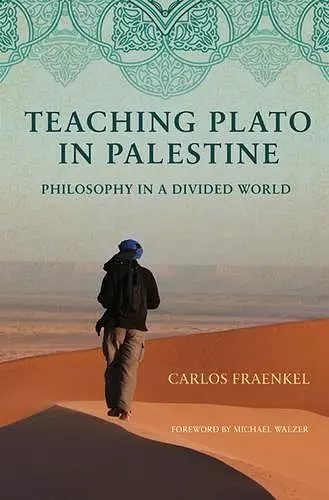Teaching Plato in Palestine
Philosophy in a Divided World
Format:Paperback
Publisher:Princeton University Press
Published:6th Dec '16
Should be back in stock very soon

Teaching Plato in Palestine is part intellectual travelogue, part plea for integrating philosophy into our personal and public life. Philosophical toolkit in tow, Carlos Fraenkel invites readers on a tour around the world as he meets students at Palestinian and Indonesian universities, lapsed Hasidic Jews in New York, teenagers from poor neighborhoods in Brazil, and the descendants of Iroquois warriors in Canada. They turn to Plato and Aristotle, al-Ghaz?l? and Maimonides, Spinoza and Nietzsche for help to tackle big questions: Does God exist? Is piety worth it? Can violence be justified? What is social justice and how can we get there? Who should rule? And how shall we deal with the legacy of colonialism? Fraenkel shows how useful the tools of philosophy can be--particularly in places fraught with conflict--to clarify such questions and explore answers to them. In the course of the discussions, different viewpoints often clash. That's a good thing, Fraenkel argues, as long as we turn our disagreements on moral, religious, and philosophical issues into what he calls a "culture of debate." Conceived as a joint search for the truth, a culture of debate gives us a chance to examine the beliefs and values we were brought up with and often take for granted. It won't lead to easy answers, Fraenkel admits, but debate, if philosophically nuanced, is more attractive than either forcing our views on others or becoming mired in multicultural complacency--and behaving as if differences didn't matter at all.
Winner of the 2015 Mavis Gallant Prize for Non-Fiction, Quebec Writers' Federation One of The Australian's Books of the Year 2015 (selected by Aminatta Forna) Longlisted for the 2016 Sheikh Zayed Book Award in Arabic Culture in Other Languages "Engagingly anecdotal."--Peter Adamson, Times Literary Supplement "What unites [the classroom conversations] is [Fraenkel's] skill in the art of posing questions designed to perplex and provoke. He lets us overhear the Socratic form of dialogue that Plato invented and that Mr. Fraenkel practices much to his students' pleasure, and ours."--Benjamin Balint, Wall Street Journal "Fresh, iconoclastic, stimulating debates."--Kirkus "The author urges religious people who aren't bound by literalism, secularists who don't dismiss all religion as anachronism, and inquisitive types of all persuasions to try something. First, accept freedom of expression, recognize your fallibility and prepare yourself to revise received assumptions. And then plunge into debates about morality, faith, governance, rights and other matters that divide us ... the discussions you engage in, as suggested by his and his students' experiences, will likely broaden your horizons and nourish your intellect."--Rayyan Al-Shawaf, Toronto Star "If you read one book published this year, then you might make it Teaching Plato in Palestine: Philosophy in a Divided World."--Aminatta Forna, The Independent "Teaching Plato in Palestine is a slim, straightforward yet surprisingly rich work of philosophy that will intrigue the amateur as well as the expert."--Sarah Gustafson, Key Reporter "Carlos Fraenkel ... persuasively shows the value of philosophical work that engages the broader public and other cultures... Each [episode in the book] is beautifully described and the results are utterly captivating."--Daniel A. Bell, Literary Review of Canada "A refreshing perspective."--Frank Freeman, The Hedgehog Review "A lively, informative book."--Alexander Orwin, Claremont Review of Books "Fraenkel's commitment to democratizing philosophy is both authentic and admirable. His book reminds us that philosophy is a practice of educating citizens, a dialogical quest for mutual understanding. It is a timely reminder that engaging others over disputed values and beliefs requires not only skill in argument but also an openness toward different views and a commitment to the shared pursuit of truth. This remarkable experiment in practicing Socratic dialogue in a divided world proves that we need philosophy now more than ever, especially when ideology and nihilism threaten to undermine any ethical culture of debate."--Robert Sinnerbrink, Los Angeles Review of Books
ISBN: 9780691173368
Dimensions: unknown
Weight: 255g
248 pages
Revised edition